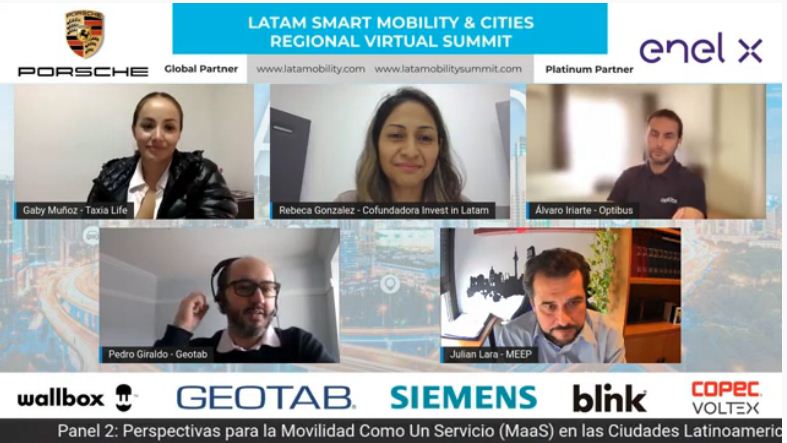Mobility as a Service (MaaS) has taken off in Latin America during the COVID-19 pandemic, with people increasingly using digitalization and platforms to get around safely.
Instead of having to locate, book, and pay for each mode of transportation separately, MaaS applications are starting to move towards an interconnected approach with leading companies joining efforts in this direction.
Faced with this new reality left by the pandemic, prestigious companies’ representatives met at Latam Mobility’s “Latam Smart Mobility & Cities Virtual Summit” to discuss the “Perspectives for Mobility as a Service (MaaS) in Latin American Cities”. The meeting was led by Rebeca González, CEO at Invest In Latam, who was in charge of moderating the forum.
Gaby Muñoz – Co-Founder & CEO of Taxia Life, a company with an Automated System providing a technology-enabled and secure transportation solution in 25 Latin American cities, highlighted the challenges facing mobility today.
“With COVID-19, everything was streamlined; automatic payments, everything digital, instantly, even the debit to the driver, which made us evolve with large platforms with a button to request transportation,” he said.
Given this new reality, Muñoz highlighted the need to offer to users an interconnected system where all transportation solutions coexist. “We have to interconnect and take advantage of this technological boom. The user must have a comprehensive option where all mobility services are available with quality and access, representing a great challenge for governments and cities”.
The Taxia Life Executive revealed that they are working to offer a safe corporate mobility service, and emphasized that their management with governments has had an impressive journey with a long way to go and to integrate.
She stressed that they see the long-term evolution of mobility focused on the quality of life through data and predictions, in order to provide a better service that will make a vital contribution to the environment. “We work on how to create a better world from technology,” she sentenced.
Geotab and Data Focus
“You can’t manage what you don’t measure” is Geotab’s motto regarding its important contribution to Mobility as a Service. Pedro Giraldo, Business Development Manager Government Latam at the company, believes that the pandemic has been a springboard to MaaS management and evolution technology.
“We were affected in sales, but we became wealthier in data and analytics for companies and governments. We have launched new mobility solutions, such as the one making customers forget about physical keys; we also launched the information unit for smart cities and improving traffic flow. This new reality has brought many opportunities and has accelerated innovation processes,” he explained.
Giraldo stated that Latin American governments play a crucial role in the evolution of mobility with the redesign of cities and the investment needed, for example, in the electrification of vehicles.
“Electric vehicles should not be a headache for authorities, but a valuable data source that allows forecasting, planning, optimizing and reducing costs,” he stressed.
Looking ahead, the Geotab leader sees Mobility as a Service as a robust user-focused platform, with breakthroughs for autonomous vehicles that will reduce transportation costs and decrease the private car usage. He is confident that there will be a defined legal framework for the system to flow naturally, with permanent incentives related to taxes or other subsidies.
Optibus and Rapid Response to the Pandemic
Alvaro Iriarte, Regional Director South Cone at Optibus, an Israeli company that provides bus and driver planning software through an electric fleet scheduling module, with a presence across a thousand cities around the world, offered details of the adaptation to COVID-19.
“We have a 100% cloud platform, so we solve complex problems quickly. In the pandemic, operations changed and transportation companies had to make new travel plans. This was an accelerator in our technology, and that is why we reached so many cities in such a short time,” he explained.
He pointed out that given the low demand in public transportation, Optibus intensified its efforts to provide innovative solutions to help resume normal mobility activity in a safe, efficient and environmentally friendly manner.
“What the user wants is to have everything on one application, you have to integrate. We can do that programming to interconnect micromobility, and it is very important that cities are prepared for this,” said Iriarte.
Under the premise “The future of public transportation today,” Optibus has a platform that looks to the future where transportation will be zero emissions, a transformation that is going faster than expected. “It is happening in less time than planned. In Chile, 2050 was talked about and that goal could be cut to 2030 where a 100% electric fleet is expected.
“You Are How You Move”
Julian Lara, International Expansion Director for Meep, a sustainable urban mobility platform with a presence in 20 cities, working closely with both the public and private sector, also offered his point of view on the current state of MaaS.
“The pandemic has accelerated the use of technological platforms for public transportation with digital payment and mobile technology, representing fundamental bases to consolidate a new efficient business model that saves costs,” he said.
Meep’s leader considers it fundamental for cities to bring improvements at the level of health and service, with the objective of providing an optimal quality of life for people.
“We have to integrate mass transportation with micromobility options in a single platform, that is key. In Latin America, there are 75 cities with more than one million inhabitants, so we have to work to ease mobility and get citizens out of the private car and back into shared mobility. We have to set up bicycle paths, public bicycle systems and we as a platform can contribute a lot,” he concluded.




